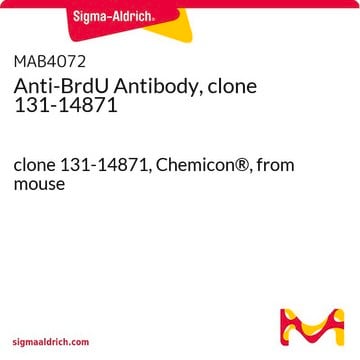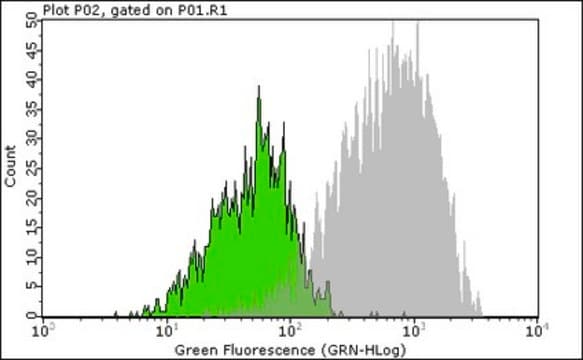MAB3262B
Anti-BrdU Antibody, clone PRB-1, biotin conjugated
clone PRB-1, Chemicon®, from mouse
Synonym(s):
BrdU
Sign Into View Organizational & Contract Pricing
All Photos(1)
About This Item
UNSPSC Code:
12352203
eCl@ss:
32160702
NACRES:
NA.41
Recommended Products
biological source
mouse
Quality Level
conjugate
biotin conjugate
antibody form
purified immunoglobulin
antibody product type
primary antibodies
clone
PRB-1, monoclonal
species reactivity (predicted by homology)
all
manufacturer/tradename
Chemicon®
technique(s)
flow cytometry: suitable
isotype
IgG1κ
shipped in
wet ice
target post-translational modification
unmodified
Related Categories
Specificity
Recognizes BrdU in ssDNA, free BrdU or BrdU coupled to a protein carrier. MAB3262 also reacts with iodouridine. Does not react with thymidine.
Immunogen
Iodouridine conjugated to ovalbumin.
Application
Flow cytometry: 1:20
Optimal working dilutions must be determined by the end user.
Optimal working dilutions must be determined by the end user.
Research Category
Epigenetics & Nuclear Function
Epigenetics & Nuclear Function
Research Sub Category
Cell Cycle, DNA Replication & Repair
Cell Cycle, DNA Replication & Repair
Use Anti-BrdU Antibody, clone PRB-1, biotin conjugated (Mouse Monoclonal Antibody) validated in FC to detect Bromodeoxyuridine also known as BrdU.
Physical form
Purified immunoglobulin conjugated to biotin. Liquid in PBS, pH 7.4 containing 0.05% sodium azide.
Storage and Stability
Maintain at 2-8°C in undiluted aliquots up to 6 months after date of receipt. Protect from prolonged exposure to light.
During shipment, small volumes of product will occasionally become entrapped in the seal of the product vial. For products with volumes of 200 μL or less, we recommend gently tapping the vial on a hard surface or briefly centrifuging the vial in a tabletop centrifuge to dislodge any liquid in the container′s cap.
During shipment, small volumes of product will occasionally become entrapped in the seal of the product vial. For products with volumes of 200 μL or less, we recommend gently tapping the vial on a hard surface or briefly centrifuging the vial in a tabletop centrifuge to dislodge any liquid in the container′s cap.
Other Notes
Concentration: Please refer to the Certificate of Analysis for the lot-specific concentration.
Legal Information
CHEMICON is a registered trademark of Merck KGaA, Darmstadt, Germany
Disclaimer
Unless otherwise stated in our catalog or other company documentation accompanying the product(s), our products are intended for research use only and are not to be used for any other purpose, which includes but is not limited to, unauthorized commercial uses, in vitro diagnostic uses, ex vivo or in vivo therapeutic uses or any type of consumption or application to humans or animals.
Not finding the right product?
Try our Product Selector Tool.
Storage Class Code
12 - Non Combustible Liquids
WGK
WGK 2
Flash Point(F)
Not applicable
Flash Point(C)
Not applicable
Certificates of Analysis (COA)
Search for Certificates of Analysis (COA) by entering the products Lot/Batch Number. Lot and Batch Numbers can be found on a product’s label following the words ‘Lot’ or ‘Batch’.
Already Own This Product?
Find documentation for the products that you have recently purchased in the Document Library.
Xingyu Lv et al.
Hepatology communications, 6(9), 2340-2353 (2022-05-06)
Pyroptosis is a kind of programmed cell death primarily mediated by gasdermin D (GSDMD) and shown to regulate multiple diseases. However, its contribution to liver regeneration, a fine-tuned tissue repair process mediated primarily by hepatocytes after mass loss, remains unclear.
R Sartaj et al.
Scientific reports, 7(1), 3793-3793 (2017-06-21)
In order to identify reliable markers of corneal epithelial stem cells, we employed an inducible transgenic "pulse-chase" murine model (K5Tta × TRE-H2BGFP) to localize, purify, and characterize slow cycling cells in the cornea. The retention of GFP labeling in slowly dividing cells
Katharine Cecchini et al.
Reproduction (Cambridge, England), 165(2), 183-196 (2022-11-18)
The testis-specific transcription factor, TCFL5, expressed in pachytene spermatocytes regulates the meiotic gene expression program in collaboration with the transcription factor A-MYB. In male mice, the transcription factors STRA8 and MEISON initiate meiosis I. We report that STRA8/MEISON activates the
Rebeca Piatniczka Iglesia et al.
Stem cell research & therapy, 8(1), 76-76 (2017-04-18)
Glioblastoma (GBM), a highly aggressive brain tumor, contains a subpopulation of glioblastoma stem-like cells (GSCs) that play roles in tumor maintenance, invasion, and therapeutic resistance. GSCs are therefore a promising target for GBM treatment. Our group identified the cellular prion
Our team of scientists has experience in all areas of research including Life Science, Material Science, Chemical Synthesis, Chromatography, Analytical and many others.
Contact Technical Service







